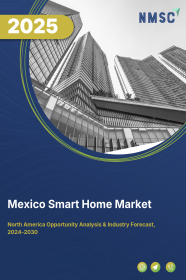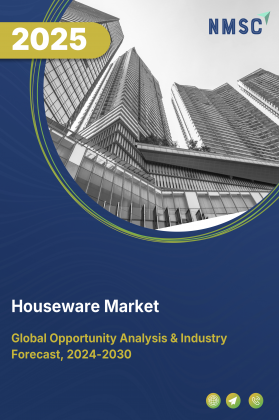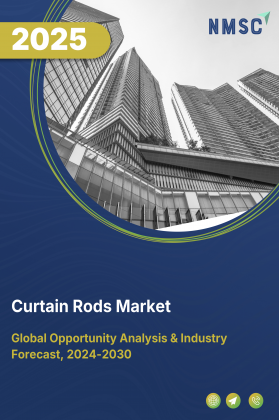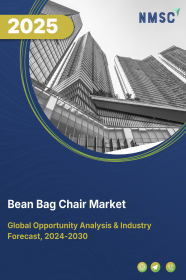
Mexico Smart Home Market by Product Type (Smart Lighting, and Others), by Communication Protocol (Wifi, Zigbee, and Others), by Smart Home Hubs (Standalone Hubs, and Built-in Hubs), by Voice Assistants Integration (Amazon Alexa, and Others), by Smart Home Compatibility with Smartphones (iOS, and Android), by Installation (DIY Intallation, and Professional Installation), by Professional Installation (Online, and Offline)– Opportunity Analysis and Industry Forecast, 2024–2030.
Industry: Retail and Consumer | Publish Date: 29-Aug-2025 | No of Pages: 147 | No. of Tables: 109 | No. of Figures: 74 | Format: PDF | Report Code : RC2267
Mexico Smart Home Market Overview
The Mexico Smart Home Market size was valued at USD 8.23 billion in 2023, and is predicted to reach USD 25.5 billion by 2030, at a CAGR of 17.5% from 2024 to 2030. A smart home, alternatively termed a connected home, denotes a dwelling outfitted with cutting-edge technology and automated systems facilitating centralized control and monitoring of diverse household devices, appliances, and security features via a unified network.
These intelligent home automation devices are remotely accessible and frequently respond to voice commands or predetermined schedules, augmenting convenience, energy efficiency, and security for homeowners. Common components of connected homes encompass smart thermostats, lighting systems, security cameras, voice assistants, and other interconnected devices aimed at enhancing the overall residential lifestyle.
Rapid Urbanization is Driving the Mexico Smart Home Market Growth
Mexico’s rapid urbanization is playing a pivotal role in accelerating the adoption of smart home technologies. With approximately 80% of the population living in urban areas, as reported by the United Nations Human Settlements Programme, the demand for connected living solutions is intensifying. Urban residents, particularly in Mexico City, Guadalajara, and Monterrey, are increasingly drawn to automation technologies that enhance comfort, safety, and energy efficiency.
Smart lighting systems, security cameras, voice-activated controls, and energy-monitoring devices are gaining popularity among tech-savvy urban consumers seeking convenience and modern lifestyles. As residential developments in major cities continue to expand, the smart home ecosystem in Mexico is benefiting from improved infrastructure and broader device availability, fueling sustained market growth.
Rising GDP and Economic Development Boosts the Mexico Smart Home Market
Mexico’s steady economic growth and rising gross domestic product (GDP) are contributing significantly to the expansion of its smart home market. With a growing middle-class population enjoying higher disposable incomes, more households are investing in smart devices to improve living standards and home functionality. This trend is particularly visible in suburban and metropolitan areas where financial capacity aligns with lifestyle aspirations.
Connected home solutions such as smart thermostats, automated blinds, and centralized control hubs are increasingly seen not just as luxury items, but as value-adding components of everyday life. The positive economic environment in Mexico, alongside greater access to financing and consumer electronics, is creating fertile ground for broader smart home adoption across various income segments.
Security and Data Privacy Concerns Challenge the Mexico Smart Home Market Expansion
Despite robust growth, the Mexico smart home market faces significant challenges related to data privacy and cybersecurity. As homes become increasingly connected—featuring smart locks, surveillance systems, and voice-activated assistants—concerns over potential hacking, unauthorized access, and data misuse are mounting. These vulnerabilities can compromise not only user privacy but also personal safety.
Many Mexican households are still unfamiliar with best practices for securing connected devices, such as using strong passwords, updating firmware regularly, or safeguarding Wi-Fi networks. Without adequate user education and built-in security measures, the market risks hesitation from consumers who prioritize digital safety. Addressing these concerns through industry standards and public awareness campaigns will be critical for sustaining trust and adoption.
Integration of Blockchain Presents Growth Opportunities in the Mexico Smart Home Market
The integration of blockchain technology into Mexico’s smart home ecosystem presents a promising avenue for enhanced data security and network transparency. Known for its decentralized and tamper-resistant structure, blockchain can securely encrypt smart home data and provide users with greater control over who accesses their information. This is particularly important in a market like Mexico, where cybersecurity concerns are a major barrier to adoption.
Blockchain-enabled smart contracts can automate and authenticate device interactions, ensuring that only verified devices operate within a home’s connected environment. By decentralizing access control and improving transparency, blockchain not only boosts consumer confidence but also opens new possibilities for secure, scalable, and intelligent smart home networks in Mexico—driving innovation and long-term market expansion.
Competitive Landscape
Several market players operating in the Mexico smart home industry include Amazon (Echo/Alexa), Google Nest, Schneider Electric, Xiaomi, Bosch Smart Home, ABB, Lutron, Apple, Toshiba Corporation, Panasonic Corporation, Signify N.V., Whirlpool Corporation, TP-Link, ntrol4, msung Electronics
Mexico Smart Home Market Key Segments
By Product Type
-
Smart Lighting
-
Smart Bulbs
-
Smart Light Strips
-
Smart Switches
-
-
Smart Home Security and Surveillance
-
Smart Cameras
-
Video Doorbells
-
Smart Locks
-
Security System
-
-
Smart Entertainment
-
Smart TVs
-
Smart Speakers
-
Streaming Devices
-
-
Smart Appliances
-
Smart Refrigerators
-
Smart Ovens
-
Smart Washing Machines
-
Smart Dishwashers
-
Smart Home HVAC Management
-
Other Smart Appliances
-
By Communication Protocol
-
Wi-Fi
-
Zigbee
-
Z-wave
-
Bluetooth
-
Thread
By Smart Home Hubs
-
Standalone Hubs
-
Built-in Hubs
By Voice Assistants Integration
-
Amazon Alexa
-
Google Assistant
-
Apple Siri
-
Others
By Smart Home Compatibility with Smartphones
-
iOS
-
Android
By Installation
-
DIY Installation
-
Professional Installation
By Sales Channel
-
Online Retailers
-
E-commerce Platforms
-
Company Websites
-
-
Offline Retailers
-
Retail Stores
-
Supermarkets & Hypermarkets
-
Specialty Stores
-
Key Players
-
Amazon (Echo/Alexa)
-
Google Nest
-
Schneider Electric
-
Xiaomi
-
Bosch Smart Home
-
ABB
-
Lutron
-
Apple
-
Toshiba Corporation
-
Panasonic Corporation
-
Signify N.V.
-
Whirlpool Corporation
-
TP-Link
-
Control4
-
Samsung Electronics
REPORT SCOPE AND SEGMENTATION:
|
Parameters |
Details |
|
Market Size in 2023 |
USD 8.23 Billion |
|
Revenue Forecast in 2030 |
USD 25.5 Billion |
|
Growth Rate |
CAGR of 17.5% from 2024 to 2030 |
|
Analysis Period |
2023–2030 |
|
Base Year Considered |
2023 |
|
Forecast Period |
2024–2030 |
|
Market Size Estimation |
Billion (USD) |
|
Growth Factors |
|
|
Companies Profiled |
15 |
|
Market Share |
Available for 10 companies |
|
Customization Scope |
Free customization (equivalent up to 80 working hours of analysts) after purchase. Addition or alteration to country, regional, and segment scope. |
|
Pricing and Purchase Options |
Avail customized purchase options to meet your exact research needs. |

















 Speak to Our Analyst
Speak to Our Analyst
























